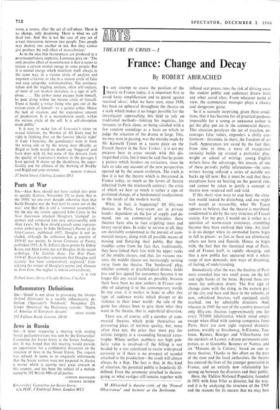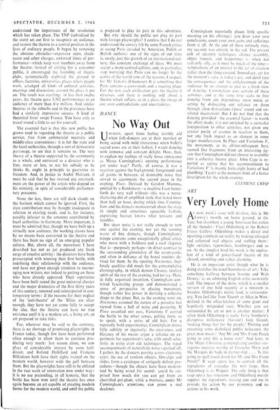THEATRE IN CRISISâ 1
France: Change and Decay
By ROBERT ABIRACHED IN any attempt to assess the position of the theatre in France today, it is important first to avoid hasty simplification and to guard against received ideas : what we have seen, since 1950, has been an upheaval throughout the theatre on a scale which makes it no longer possible for the investigator approaching this field to rely on traditional methodsâlimiting his inquiries, for instance, to Paris alone, or being satisfied with a few random soundings as a basis on which to judge the situation of the drama at large. This, we may note in passing, was the mistake made by Mr Kenneth Tynan in a recent piece on the French theatre in the New Yorker: it is not my purpose here to cross swords with this dis- tinguished critic, but it must be said that he paints a picture which borders on caricature, since he fails to take any account of the new perspectives opened up by the recent evolution. The truth is that it is not the theatre which is threatened in France today, so much as the forms of theatre inherited from the nineteenth century : the crisis of which we hear so much is rather a sign of profound change, of a fundamental readjustment to the needs of the modern world.
What, in fact, is happening? Of fifty-two theatres in Paris, forty-seven are in private hands: dependent on the law of supply and de- mand, run on commercial principles, these theatres have also to face crippling taxes and heavy social dues. In order to survive at all, they are inevitably condemned to the pursuit of com- mercial success, along with all possible means of wooing and flattering their public. But their troubles come from the fact that, traditionally, they have linked their fate with the upper ranks of the middle classes, and that, for various rea- sons, the middle classes are increasingly turning away from the theatre. The 'boulevard' play, whether comedy or psychological drama, holds less and less appeal for consumers because it no longer fills any social need, or, possibly, because there have been no new authors in France cap- able of adapting it to the contemporary world. In any case, it is useless to hope to offer this type of audience works which disrupt or do violence to their inner world : the rule of the game has always been to give them what they want in the theatre, that is, superficial diversion.
There are, of course, still a number of com- mercial theatres which pride themselves on presenting plays of intrinsic quality, but, more often than not, the price they must pay for artistic integrity is a resounding financial catas- trophe. Where neither snobbery nor high pub- licity value is involvedâif the billing is not headed by a star calculated to excite widespread curiosity or if there is no prospect of scandal attached to the productionâthe result will almost always be a flop. The fact is that, in this kind of situation, the potential public is hopelessly ill- defined. Even the ceremony attached to theatre- going, or what vestiges still remain, together with M Abirached is theatre critic of the 'Nouvel Observateur' and lecturer at the Sorbonne.
inflated seat prices, runs the risk of driving away the student public and audiences drawn from any other social class. From whatever point of view, the commercial manager plays a chancy and dangerous game.
So it is scarcely surprising, given these condi- tions, that it has become for all practical purposes impossible for a young or unknown author to get his play put on in the commercial theatre. This situation paralyses the act of creation, en- courages false values, engenders a shifty con- formism: threatens, in short, the freedom of art itself. Appearances are saved by the fact that, from time to time, a wave of except;onal curiosity builds up around a particular play- wright or school of writing: young English writers have the advantage, this season, of one of these periodic public infatuationsâthe same writers having suffered a series of notable set- backs up till now. But it must be said that these exceptions have no bearing on the general rule, and cannot be taken to justify a concept of theatre now rendered null and void.
If this short view were to stop here, the situa- tion would indeed be disturbing, and one might well accept as reasonable, what Mr Tynan appears to believe, that the theatre is moribund, condemned to die by the very structure of French society. For my part, I would see it rather as a question of worm-eaten structures, crumbling because they have outlived their time. Art itself is in no danger when its outmoded forms begin to fall to pieces: as fast as these are eliminated, others are born and flourish. Hence, to begin with, the fact that the theatrical map of Paris, and of France itself, is rapidly changing, and that a new public has appeared with a whole range of new demands, new ways of dreaming, of feeling, of understanding.
Immediately after 'the war, the theatres of Paris were crowded into two small areas, on the left and right banks of the Seine. Beyond these two zones lay unbroken desert. The first sign of change came with the siting, in the eastern part of the city and here and there in the suburbs, of new, subsidised theatres, well equipped, easily reached, run by admirable directors. And, whereas in 1945 the rest of the country possessed only fifty-one theatres (approximately one for every 715,000 inhabitants), which stood empty except when filled with touring companies from Paris, there are now eight regional dramatic centres, notably at Strasbourg, St-Etienne, Tou- louse, Rennes, Bourges and Villeurbanne (on the outskirts of Lyons), a dozen permanent com- panies, as at Grenoble, Beaunes or Nantes, and six 'Maisons de la Culture,' based on one or more theatres. Thanks to this effort on the part of the state and the local authorities, the theatre has entered the lives of the younger generation in France, and an entirely new relationship has sprung up between the directors and their public.
Here, the Theatre National Populaire, founded in 1951 with Jean Vilar as director, led the way, and it is by analysing the structure of the TNP and the reasons for its success that we may best understand the importance of the revolution which has taken place. The TNP (subsidised by the state) set out first to recapture an audience, and restore the theatre to a central position in the lives of ordinary people. It began by removing the obvious obstaclesâexpensive seats, cloak- room and other charges, awkward times of per- formanceâwhich keep vast numbers away from the theatre; instead of settling for a consumer public, it encouraged the founding of theatre clubs, systematically explored the ground in offices, factories, universities. places where people work, arranged all kinds of cultural activities, meetings and discussions around the plays it put on. The result was startling: in less than twelve years, the theatre gave 3.382 performances to an audience of more than five million. And similar theatres in the suburbs and in the provinces have had a similarly impressive success. A kind of theatrical fever swept France. You have only to travel round a little to see for yourself.
The essential fact is that this new public has grown used to regarding the theatre as a public service, free from commercial necessity and middle-class conventions: it is for the state and the local authorities, through a sort of democratic patronage, to see that it remains so. The very theory of a theatre supported by the community as a whole, and entrusted to a director who is free, more or less, to use his subsidy as he thinks fit, ought in principle to guarantee its freedom. And, in justice to Andre Malraux, it must be said that he has resisted any encroach- ment on the power of the artists who depend on his ministry, in spite of considerable parliamen- tary pressures.
None the less, there are still dark clouds on the horizon which cannot be ignored. First, the state contribution may be thought inadequate in relation to existing needs, and is, for instance, notably inferior to the amounts contributed by local authorities in Germany. More important, it must be admitted that, though we have built up a virtually new audience, the working classes have by no means been converted to the theatre and there has been no sign of an emerging popular culture. But, above all, the movement I have described has not as yet produced any fresh surge of creative activity: the directors have been preoccupied with winning their first battle, with redefining their relationship with the audience, and have not given enough attention to encour- aging new writers, nor indeed to putting on those who have already appeared. Their repertoires have been built round the great universal classics and the major dramatists of the first thirty years of this century, renewed and reinterpreted in con- temporary terms: if the reasons for their neglect of the 'anti-theatre' of the 'fifties are clear enough, they have not yet come fully to accept the idea that the theatre can have no true existence until it is a modern art, a living art, an art prepared to take risks.
For, whatever may be said to the contrary, there is no shortage of promising playwrights in France today, though few have been performed often enough to allow them to continue pro- ducing very much: last season alone, we saw plays of considerable interest by some half- dozen; and Roland Dubillard and Francois Billetdoux both have their sights trained on the modern world, however wide the gulf between them. But the playwrights have still to be enlisted in the vast work of renovation now under way: it is no use pretending, in all honesty, that the battle has been won until the theatre has once again become an art capable of creating modern forms for the modern world, and until the public is prepared to play its part in this adventure.
But why should the public not play its part with foreign playwrights? I confess that I do not understand the anxiety felt by some French critics at seeing Paris invaded by American, Polish or British authors: one of the signs of our time is, surely, just this growth of an international cul- ture, this constant exchange of ideas. We must accept a many-centred culture, and, in particular, stop worrying that Paris can no longer be the centre of the world (one of the reasons, I suspect, for Mr Tynan's ill-humour). It is something that Paris remains a cross-roads and a meeting place. For the rest, each civilisation gets the theatre it deserves, and there is nothing odd about a theatre which reflects, as in a glass, the image of our own contradictions and uncertainties.



































 Previous page
Previous page